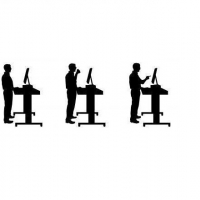
Health effects of sit-stand desks and interventions aimed to reduce sitting at work are still unproven.
Millions of people worldwide sit at a desk all day, and over recent years this has led to increased levels of physical inactivity in the work place. Health experts have warned that long periods of sitting can increase the risk of heart disease and obesity. There are a number of different approaches to reduce the amount of time we spend sitting down while at work. One option that is increasing in popularity is the sit-stand desk. These are desks that are designed to allow you to work at your desk sitting down or standing up.
A team of Cochrane Work researchers updated a systematic review that looked at the effects of different strategies to encourage people to reduce the amount of time they spend sitting at work. They looked at 34 studies with a total of 3,397 participants from high income studies. This was an increase from 20 studies when they last updated the Cochrane Review in 2016. They included evidence from both randomized and non-randomized studies.
Although sit-stand desks are popular, their potential health benefits are very uncertain. The researchers found very low-quality evidence that people who used sit-stand desks sat between 84 to 116 minutes less, compared to when they used conventional desks during the working day. Sit-stand desks also reduced total sitting time, both at work and outside work, and the durations of sitting episodes that last 30 minutes or longer. Standing more did not produce harmful effects in the studies, such as musculoskeletal pain, varicose veins, or a decrease in productivity.
Other interventions aimed at reducing inactivity, such as taking a walk during breaks and using treadmill desks had insufficient evidence to draw conclusions. The researchers found a number of limitations in the included studies that reduced their confidence in the validity and applicability of the results from the trials. The quality of evidence was low for most of the interventions looked at, mainly because the studies were poorly designed and recruited small numbers of participants.
The study’s lead author, Nipun Shrestha from the Institute for Health and Sport (IHES), Victoria University, Melbourne, Victoria, commented: “This Cochrane Review shows that, at the moment, there is uncertainty over how big an impact sit-stand desks can make on reducing the time spent sitting at work in the short term. There is also low-quality evidence of modest benefits for other types of interventions. Given the popularity of sit-stand desks in particular, we think that people who are considering investing in sit-stand desks and the other interventions covered in this review should be aware of the limitations of the current evidence base in demonstrating health benefits. We need further research to assess the effectiveness of different types of interventions for reducing sitting time in workplaces in both the short and long term. The evidence base would be improved with larger studies, longer follow-up and research from low income countries.”
Co-author Jos Verbeek, from the Cochrane Work Review Group, Kuopio, Finland, said, “It is important that workers who sit at a desk all day take an interest in maintaining and improving their well-being, both at work and at home. However, at present there is not enough high-quality evidence available to determine whether spending more time standing at work can repair the harms of a sedentary lifestyle. Standing instead of sitting hardly increases energy expenditure, so we should not expect a sit-stand desk to help in losing weight. It’s important that workers and employers are aware of this, so that they can make more informed decisions.”
· Read the Plain Language Summary
· Read the Full Cochrane Review
· Visit the Cochrane Work website
July 30, 2018
